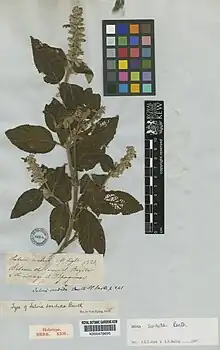Salvia sordida
Salvia sordida is a rare perennial shrub endemic to a very small area in Colombia, along an old road from Bogota to La Caro, growing at 2,600 m (8,500 ft) elevation in scrub next to streams.
| Salvia sordida | |
|---|---|
 | |
| Scientific classification | |
| Kingdom: | Plantae |
| Clade: | Tracheophytes |
| Clade: | Angiosperms |
| Clade: | Eudicots |
| Clade: | Asterids |
| Order: | Lamiales |
| Family: | Lamiaceae |
| Genus: | Salvia |
| Species: | S. sordida |
| Binomial name | |
| Salvia sordida | |
The plant reaches up to 2 m (6.6 ft) tall, with the entire plant whitish-green in color. The ovate leaves are small—4 to 6 cm (1.6 to 2.4 in) long and 2 to 3.5 cm (0.79 to 1.38 in) wide—and grey tomentose underneath. The inflorescence has short, dense, terminal racemes, with a 16 mm (0.63 in) purple corolla. Flowers also grow in the axils of the upper leaves. It is the most threatened of all Colombia species in the family Labiatae deemed as Critically Endangered by the National University of Colombia.[1][2]
Notes
- Wood, J. R. I.; Harley, R. M. (1989). "The Genus Salvia (Labiatae) in Colombia". Kew Bulletin. Springer. 44 (2): 274–275. doi:10.2307/4110799. JSTOR 4110799.
- "Universidad Nacional de Colombia:". catalogoplantasdecolombia.unal.edu.co. Retrieved 2023-06-14.
This article is issued from Wikipedia. The text is licensed under Creative Commons - Attribution - Sharealike. Additional terms may apply for the media files.